| |
| Description of High School Electives |
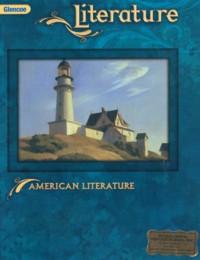 American Literature:
A collection of stories, poems, nonfiction articles and other literary works that is organized chronologically into seven units
spanning early America to the present. Background information is provided to help make the student's reading experience
more meaningful. A timeline helps keep track of major literary and historical events. A section titled Historical, Cultural, and
Social Forces explains the influence that shapes a specific literary period. American Literature:
A collection of stories, poems, nonfiction articles and other literary works that is organized chronologically into seven units
spanning early America to the present. Background information is provided to help make the student's reading experience
more meaningful. A timeline helps keep track of major literary and historical events. A section titled Historical, Cultural, and
Social Forces explains the influence that shapes a specific literary period. |
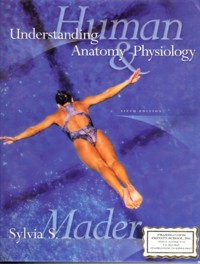 Anatomy & Physiology:
This is a college level course that helps advanced students to develop a working knowledge of (1) human anatomy and physiology that is based on conceptual understanding
rather than rote memory; (2) medical technology that will increase the student's confidence in their chosen field; and (3) clinical
applications to broaden their horizons beyond the core principles. Anatomy & Physiology:
This is a college level course that helps advanced students to develop a working knowledge of (1) human anatomy and physiology that is based on conceptual understanding
rather than rote memory; (2) medical technology that will increase the student's confidence in their chosen field; and (3) clinical
applications to broaden their horizons beyond the core principles. |
 Animal Husbandry:
Provides a condensed, highly illustrated, easy-to-read version of the
wonders, as well as the technical aspects, of animal science. Text
includes chapters on beef cattle, diseases, dairy industry, sheep,
goats, swine, poultry, horses, and rabbits. Animal Husbandry:
Provides a condensed, highly illustrated, easy-to-read version of the
wonders, as well as the technical aspects, of animal science. Text
includes chapters on beef cattle, diseases, dairy industry, sheep,
goats, swine, poultry, horses, and rabbits. |
 Drive Right:
This course provides basic instruction in vehicle operation, maneuvers, and more. The taking of this course in no way
guarantees the student will receive a driver's permit or license. Please check your local state requirements. Drive Right:
This course provides basic instruction in vehicle operation, maneuvers, and more. The taking of this course in no way
guarantees the student will receive a driver's permit or license. Please check your local state requirements. |
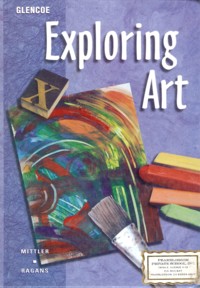 Art, Exploring:
Takes a media approach to art, focusing on the elements and principles of art
and how artists use various media and techniques, such as drawing,
painting, printmaking, and sculpting. The concepts of aesthetics, art
criticism, art history, and art production are applied and reinforced. This satisfies the 1 Credit required in Arts. Art, Exploring:
Takes a media approach to art, focusing on the elements and principles of art
and how artists use various media and techniques, such as drawing,
painting, printmaking, and sculpting. The concepts of aesthetics, art
criticism, art history, and art production are applied and reinforced. This satisfies the 1 Credit required in Arts. |
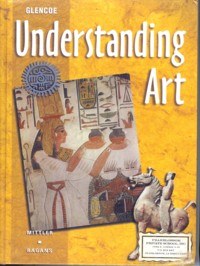 Art, Understanding:
Takes a chronological approach to art, focusing on art works from
ancient to contemporary times. The text blends art history with
cultural and social traditions, emphasizing the role of art in everyday
life. The images and content present art as historical evidence of the
creative process. This satisfies the 1 Credit required in Arts. Art, Understanding:
Takes a chronological approach to art, focusing on art works from
ancient to contemporary times. The text blends art history with
cultural and social traditions, emphasizing the role of art in everyday
life. The images and content present art as historical evidence of the
creative process. This satisfies the 1 Credit required in Arts. |
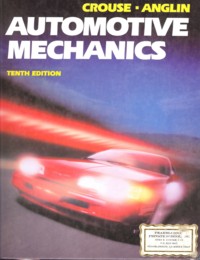 Automotive Mechanics:
This course is correlated with federal, state, apprenticeship, and
industry guidelines for automotive technician training. The text along
with the consumable student workbook can be used for reference, study,
and test preparation by anyone preparing for automotive technician
certification programs. Automotive Mechanics:
This course is correlated with federal, state, apprenticeship, and
industry guidelines for automotive technician training. The text along
with the consumable student workbook can be used for reference, study,
and test preparation by anyone preparing for automotive technician
certification programs. |
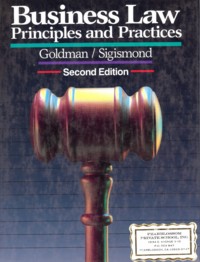 Business Law:
Provides activities to let students monitor their progress while new
unit end case activities prompt them to analyze the issues and "be the
judge." Numerous examples and case anecdotes clarify concepts and
enable students to "apply" the law to real life situations. All the
important legal topics are covered. Business Law:
Provides activities to let students monitor their progress while new
unit end case activities prompt them to analyze the issues and "be the
judge." Numerous examples and case anecdotes clarify concepts and
enable students to "apply" the law to real life situations. All the
important legal topics are covered. |
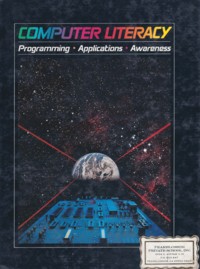 Computer Literacy:
This course teaches the student how to program the computer using the BASIC computer language.
The student will learn how to actually write computer code or statements to solve problems and
then print or display the answers. This presents the fundamentals of programming and following this course,
the student will be able to grasp other programming languages (such as C, C+, Pascal, HTML, and others) more easily. Computer Literacy:
This course teaches the student how to program the computer using the BASIC computer language.
The student will learn how to actually write computer code or statements to solve problems and
then print or display the answers. This presents the fundamentals of programming and following this course,
the student will be able to grasp other programming languages (such as C, C+, Pascal, HTML, and others) more easily. |
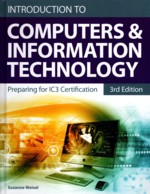 Computer Technology:
The Internet Core Competency Certification (IC3) is the worldwide benchmark to gauge a studentís understanding of computer systems (i.e., hardware, software, firmware, networking).
This course is organized into three parts: (1) computing fundamentals, (2) key applications, and (3) living online.
There are 35 chapters that each contain an overivew, objectives, terminology, "Did You Know?", real-world tech, a career corner, think critically, and extend your knowledge.
This course is designed to prepare the student for career success in a technology-based world. Computer Technology:
The Internet Core Competency Certification (IC3) is the worldwide benchmark to gauge a studentís understanding of computer systems (i.e., hardware, software, firmware, networking).
This course is organized into three parts: (1) computing fundamentals, (2) key applications, and (3) living online.
There are 35 chapters that each contain an overivew, objectives, terminology, "Did You Know?", real-world tech, a career corner, think critically, and extend your knowledge.
This course is designed to prepare the student for career success in a technology-based world. |
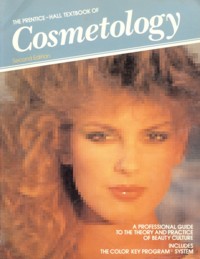 Cosmetology:
This course is available for up to 4 elective credits (1 each
course). The introductory course covers topics such as looks, skin,
hair, nails, anatomy and physiology, bacteriology and sanitation. The
intermediate course covers shampoos and rinses, scalp treatments and
hair conditioners, basic hair shaping, precision hair cutting, wet and
thermal hair styling. Cosmetology:
This course is available for up to 4 elective credits (1 each
course). The introductory course covers topics such as looks, skin,
hair, nails, anatomy and physiology, bacteriology and sanitation. The
intermediate course covers shampoos and rinses, scalp treatments and
hair conditioners, basic hair shaping, precision hair cutting, wet and
thermal hair styling. |
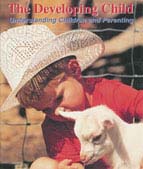 Developing Child:
This course covers observing children, baby sitting, child care,
preschools, exceptional children, teen pregnancy and parenthood, and
family stresses. Comprehensive and up to date coverage of physical,
mental, social, emotional, and moral development theories of child
development by Piaget, Erikson, Kohlberg, parenthood, pregnancy and birth. Developing Child:
This course covers observing children, baby sitting, child care,
preschools, exceptional children, teen pregnancy and parenthood, and
family stresses. Comprehensive and up to date coverage of physical,
mental, social, emotional, and moral development theories of child
development by Piaget, Erikson, Kohlberg, parenthood, pregnancy and birth. |
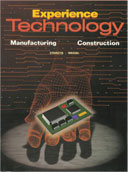 Experience Technology Manufacturing & Construction:
This book includes a science and math handbook, glossary of terms, and
chapters on topics such as Forming a Company, Researching and
Developing a Product, Materials, Controlling Manufacturing Quality,
Construction Processes, and many more. It comes with a consumable
student workbook that contains chapter reviews, basic skills
activities, and technology activities. Experience Technology Manufacturing & Construction:
This book includes a science and math handbook, glossary of terms, and
chapters on topics such as Forming a Company, Researching and
Developing a Product, Materials, Controlling Manufacturing Quality,
Construction Processes, and many more. It comes with a consumable
student workbook that contains chapter reviews, basic skills
activities, and technology activities. |
 Food for Today:
This course is a well-balanced introduction to foods and nutrition that
gives students the background knowledge and skills in 25 chapters that are in five basic units: (1)
food, nutrition, and you, (2) workspace, tools, and techniques, (3) consumer decisions, (4) foods for meals and snacks, and (5) expanding your horizons (careers in food). Food for Today:
This course is a well-balanced introduction to foods and nutrition that
gives students the background knowledge and skills in 25 chapters that are in five basic units: (1)
food, nutrition, and you, (2) workspace, tools, and techniques, (3) consumer decisions, (4) foods for meals and snacks, and (5) expanding your horizons (careers in food). |
.
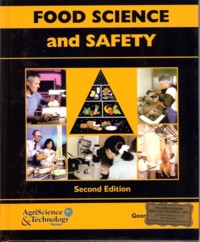 Food Science & Safety:
Explains how to achieve career success in the food industry. The
chapters explain the role and potential that food science has in the
food industry. This introductory book helps the student explore the
relationship of Food Science to disciplines such as marketing, product
development, and international development. Food Science & Safety:
Explains how to achieve career success in the food industry. The
chapters explain the role and potential that food science has in the
food industry. This introductory book helps the student explore the
relationship of Food Science to disciplines such as marketing, product
development, and international development. |
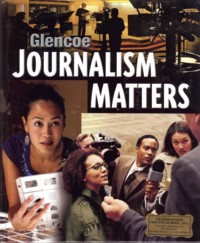 Journalism Matters:
This course brings the student up to speed as a working journalist. The chapters train the student to write well--summarize information, describe observations
and accurately record the views and comments of others. Other chapters also cover interviewing, sports writing, feature writing, and the special demands of column
and review writing. Still other chapters cover the knowledge and skills required to bring a product to the public's attention. This satisfies the 1 Credit required in Arts. Journalism Matters:
This course brings the student up to speed as a working journalist. The chapters train the student to write well--summarize information, describe observations
and accurately record the views and comments of others. Other chapters also cover interviewing, sports writing, feature writing, and the special demands of column
and review writing. Still other chapters cover the knowledge and skills required to bring a product to the public's attention. This satisfies the 1 Credit required in Arts. |
 Livestock:
This course serves as an introduction to animal science and veterinary
technology. It is about far more than cattle, swine, and chickens,
though these are included. Basics of biology and veterinary technology
practices are included. The course covers aquatic animals, draft
animals, dogs, cats, birds, rodents, reptiles and service, laboratory,
and exotic animals. Livestock:
This course serves as an introduction to animal science and veterinary
technology. It is about far more than cattle, swine, and chickens,
though these are included. Basics of biology and veterinary technology
practices are included. The course covers aquatic animals, draft
animals, dogs, cats, birds, rodents, reptiles and service, laboratory,
and exotic animals. |
 Marketing Practices and Principles:
Contains 42 chapters dealing with the world of marketing, the consumer
market, special markets, marketing research, the product, pricing,
channels of distribution, wholesaling, advertising, marketing
management, business management, and entrepreneurship. Marketing Practices and Principles:
Contains 42 chapters dealing with the world of marketing, the consumer
market, special markets, marketing research, the product, pricing,
channels of distribution, wholesaling, advertising, marketing
management, business management, and entrepreneurship. |
 Landscape Design, Construction, and Maintenance:
Introduces various aspects of the landscape industry. Plant selection
and care are the foundation of the book. Landscaping has been one of the
fastest growing segments of the horticulture industry. The design of
new landscapes, the building of landscapes, and the maintenance of
existing landscapes are in high demand. The steps to developing a
complete and functional landscape plan for the residential setting are
identified and explained. Landscape Design, Construction, and Maintenance:
Introduces various aspects of the landscape industry. Plant selection
and care are the foundation of the book. Landscaping has been one of the
fastest growing segments of the horticulture industry. The design of
new landscapes, the building of landscapes, and the maintenance of
existing landscapes are in high demand. The steps to developing a
complete and functional landscape plan for the residential setting are
identified and explained. |
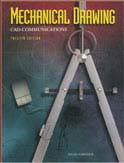 Mechanical Drawing (CAD-Communications):
Introduces students to CAD (Computer Aided Drafting). The student
learns to visualize in three dimension, to build technical
imaginations, to think precisely, and to understand the language and
gain the skills required by today's industry. The course heavily
emphasizes the basic elements and concepts of drafting. A student
workbook is provided which includes drawing assignments that thoroughly
cover all basic elements of drafting. A variety of advanced problems
are also included to accommodate the student who has progressed at a
quicker rate. Mechanical Drawing (CAD-Communications):
Introduces students to CAD (Computer Aided Drafting). The student
learns to visualize in three dimension, to build technical
imaginations, to think precisely, and to understand the language and
gain the skills required by today's industry. The course heavily
emphasizes the basic elements and concepts of drafting. A student
workbook is provided which includes drawing assignments that thoroughly
cover all basic elements of drafting. A variety of advanced problems
are also included to accommodate the student who has progressed at a
quicker rate. |
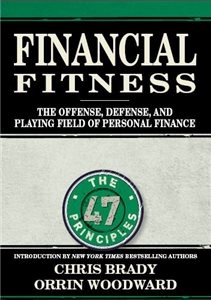 Personal Finance:
The Financial Fitness course is for everyone. Just as one becomes physically
or mentally fit, one becomes financially fit through the same two requirements:
knowing what to do and taking the necessary action to do it. Regardless of your
current financial situation, you can learn to prosper, conserve, and multiply
the fruits of your labor through a basic understanding of the principles behind
the Offense, Defense, and Playing Field of personal finance. This course brings all of these fundamentals together in one convenient
location so you can become the master of your money and prosper in any economy. Personal Finance:
The Financial Fitness course is for everyone. Just as one becomes physically
or mentally fit, one becomes financially fit through the same two requirements:
knowing what to do and taking the necessary action to do it. Regardless of your
current financial situation, you can learn to prosper, conserve, and multiply
the fruits of your labor through a basic understanding of the principles behind
the Offense, Defense, and Playing Field of personal finance. This course brings all of these fundamentals together in one convenient
location so you can become the master of your money and prosper in any economy. |
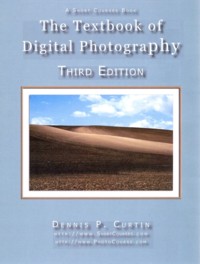 Digital Photography:
This e-book (or electronic book supplied as a DVD) focuses on core material--those aspects of photography that are essential to understand. Included are separate online animations,
movies, Web sites, Excel worksheets and PDFs designed to help you better understand the basic concepts of digital photography so that it
is easier for you to master your camera and its controls. Although having a digital camera will enhance your experience during this course, it is not mandatory that you have such a camera.
Digital Photography:
This e-book (or electronic book supplied as a DVD) focuses on core material--those aspects of photography that are essential to understand. Included are separate online animations,
movies, Web sites, Excel worksheets and PDFs designed to help you better understand the basic concepts of digital photography so that it
is easier for you to master your camera and its controls. Although having a digital camera will enhance your experience during this course, it is not mandatory that you have such a camera. |
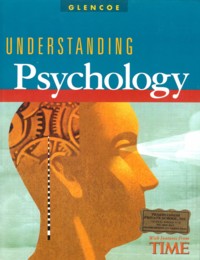 Understanding Psychology:
As a social science, psychology explores the influence of society on individual behavior and group relationships.
As a natural science, psychology looks for biological explanations for human behavior. The student will learn to think like a scientist and use
the scientific method to solve problems. The student will learn more about himself/herself and more about others.
Psychologists attempt to explain and predict why people behave, feel, and think as they do. They attempt to learn ways in which
people can improve the quality of life. Understanding Psychology:
As a social science, psychology explores the influence of society on individual behavior and group relationships.
As a natural science, psychology looks for biological explanations for human behavior. The student will learn to think like a scientist and use
the scientific method to solve problems. The student will learn more about himself/herself and more about others.
Psychologists attempt to explain and predict why people behave, feel, and think as they do. They attempt to learn ways in which
people can improve the quality of life. |
 Glencoe Speech:
The text covers a full range of topics, from different types of interpersonal communication to preparing and presenting speeches to debate and parliamentary procedure.
The tone of the text is friendly and engaging. The authors believe strongly that communication is a key skill for all people and have, therefore developed the exercises and
activities to address the various aspects of communication as well as how it relates to life at school, at work, and in relationships. The text includes many cartoons and
humorous anecdotes. The quips and quotes will entertain you. The writing style is personal and friendly. Glencoe Speech:
The text covers a full range of topics, from different types of interpersonal communication to preparing and presenting speeches to debate and parliamentary procedure.
The tone of the text is friendly and engaging. The authors believe strongly that communication is a key skill for all people and have, therefore developed the exercises and
activities to address the various aspects of communication as well as how it relates to life at school, at work, and in relationships. The text includes many cartoons and
humorous anecdotes. The quips and quotes will entertain you. The writing style is personal and friendly. |
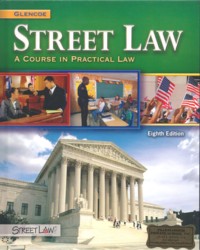 Street Law:
Presents topics dealing with the most current law-related issues, including terrorism, technology, and immigration law.
Emphasis is placed on promoting alternative (nonjudicial) forms of dispute resolution. This course provides practical
information and problem-solving opportunities that provide students with the knowledge and skills necessary for
survival in a law-saturated society. The curriculum includes case studies, mock trials, and role-plays. Street Law:
Presents topics dealing with the most current law-related issues, including terrorism, technology, and immigration law.
Emphasis is placed on promoting alternative (nonjudicial) forms of dispute resolution. This course provides practical
information and problem-solving opportunities that provide students with the knowledge and skills necessary for
survival in a law-saturated society. The curriculum includes case studies, mock trials, and role-plays. |
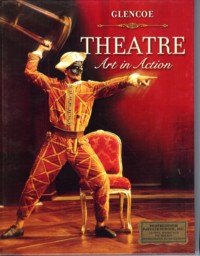 Glencoe Theatre:
Assists the student in learning about theatre by offering a variety of interesting and stimulating activities and performance projects. There are exercises in which the
student can immediately apply the skills that he/she are learning. Three major strands deal with Acting, Directing & Producing, and Technical Theatre. These strands
are organized into four sections: Exploration which explains the basic tools and techniques; Preparatory which gets the student ready for a production; Performance which
moves through the rehearsal process to opening night; and Specialization which presents various types of specialized theatre activities. This satisfies the 1 Credit required in Arts. Glencoe Theatre:
Assists the student in learning about theatre by offering a variety of interesting and stimulating activities and performance projects. There are exercises in which the
student can immediately apply the skills that he/she are learning. Three major strands deal with Acting, Directing & Producing, and Technical Theatre. These strands
are organized into four sections: Exploration which explains the basic tools and techniques; Preparatory which gets the student ready for a production; Performance which
moves through the rehearsal process to opening night; and Specialization which presents various types of specialized theatre activities. This satisfies the 1 Credit required in Arts. |
 Typing:
This course is supplied in text book form or the student may utilize
any computer typing tutor program of their choice (usually available at
any software retail store). Typing:
This course is supplied in text book form or the student may utilize
any computer typing tutor program of their choice (usually available at
any software retail store). |
 World of Work, Advancing in the:
Shows how to meet challenges with confidence and provides knowledge
needed to advance in your career. Explore skills such as communication,
math, and computer skills. World of Work, Advancing in the:
Shows how to meet challenges with confidence and provides knowledge
needed to advance in your career. Explore skills such as communication,
math, and computer skills. |
 World of Work, Succeeding in the:
An easy-to-read and easy-to-comprehend text divided into seven units which lead students from Self Assessment,
Exploring Careers, and Finding a Job through Joining the Workforce and Professional Development, and on to Lifelong Learning.
Special features in each chapter are designed to engage students
interest, for example Exploring Career Do's and Don'ts and others. World of Work, Succeeding in the:
An easy-to-read and easy-to-comprehend text divided into seven units which lead students from Self Assessment,
Exploring Careers, and Finding a Job through Joining the Workforce and Professional Development, and on to Lifelong Learning.
Special features in each chapter are designed to engage students
interest, for example Exploring Career Do's and Don'ts and others. |
| Top |
|
|
 American Literature:
A collection of stories, poems, nonfiction articles and other literary works that is organized chronologically into seven units
spanning early America to the present. Background information is provided to help make the student's reading experience
more meaningful. A timeline helps keep track of major literary and historical events. A section titled Historical, Cultural, and
Social Forces explains the influence that shapes a specific literary period.
American Literature:
A collection of stories, poems, nonfiction articles and other literary works that is organized chronologically into seven units
spanning early America to the present. Background information is provided to help make the student's reading experience
more meaningful. A timeline helps keep track of major literary and historical events. A section titled Historical, Cultural, and
Social Forces explains the influence that shapes a specific literary period. Anatomy & Physiology:
This is a college level course that helps advanced students to develop a working knowledge of (1) human anatomy and physiology that is based on conceptual understanding
rather than rote memory; (2) medical technology that will increase the student's confidence in their chosen field; and (3) clinical
applications to broaden their horizons beyond the core principles.
Anatomy & Physiology:
This is a college level course that helps advanced students to develop a working knowledge of (1) human anatomy and physiology that is based on conceptual understanding
rather than rote memory; (2) medical technology that will increase the student's confidence in their chosen field; and (3) clinical
applications to broaden their horizons beyond the core principles. Animal Husbandry:
Provides a condensed, highly illustrated, easy-to-read version of the
wonders, as well as the technical aspects, of animal science. Text
includes chapters on beef cattle, diseases, dairy industry, sheep,
goats, swine, poultry, horses, and rabbits.
Animal Husbandry:
Provides a condensed, highly illustrated, easy-to-read version of the
wonders, as well as the technical aspects, of animal science. Text
includes chapters on beef cattle, diseases, dairy industry, sheep,
goats, swine, poultry, horses, and rabbits. Drive Right:
This course provides basic instruction in vehicle operation, maneuvers, and more. The taking of this course in no way
guarantees the student will receive a driver's permit or license. Please check your local state requirements.
Drive Right:
This course provides basic instruction in vehicle operation, maneuvers, and more. The taking of this course in no way
guarantees the student will receive a driver's permit or license. Please check your local state requirements. Art, Exploring:
Takes a media approach to art, focusing on the elements and principles of art
and how artists use various media and techniques, such as drawing,
painting, printmaking, and sculpting. The concepts of aesthetics, art
criticism, art history, and art production are applied and reinforced. This satisfies the 1 Credit required in Arts.
Art, Exploring:
Takes a media approach to art, focusing on the elements and principles of art
and how artists use various media and techniques, such as drawing,
painting, printmaking, and sculpting. The concepts of aesthetics, art
criticism, art history, and art production are applied and reinforced. This satisfies the 1 Credit required in Arts. Art, Understanding:
Takes a chronological approach to art, focusing on art works from
ancient to contemporary times. The text blends art history with
cultural and social traditions, emphasizing the role of art in everyday
life. The images and content present art as historical evidence of the
creative process. This satisfies the 1 Credit required in Arts.
Art, Understanding:
Takes a chronological approach to art, focusing on art works from
ancient to contemporary times. The text blends art history with
cultural and social traditions, emphasizing the role of art in everyday
life. The images and content present art as historical evidence of the
creative process. This satisfies the 1 Credit required in Arts. Automotive Mechanics:
This course is correlated with federal, state, apprenticeship, and
industry guidelines for automotive technician training. The text along
with the consumable student workbook can be used for reference, study,
and test preparation by anyone preparing for automotive technician
certification programs.
Automotive Mechanics:
This course is correlated with federal, state, apprenticeship, and
industry guidelines for automotive technician training. The text along
with the consumable student workbook can be used for reference, study,
and test preparation by anyone preparing for automotive technician
certification programs. Business Law:
Provides activities to let students monitor their progress while new
unit end case activities prompt them to analyze the issues and "be the
judge." Numerous examples and case anecdotes clarify concepts and
enable students to "apply" the law to real life situations. All the
important legal topics are covered.
Business Law:
Provides activities to let students monitor their progress while new
unit end case activities prompt them to analyze the issues and "be the
judge." Numerous examples and case anecdotes clarify concepts and
enable students to "apply" the law to real life situations. All the
important legal topics are covered. Computer Literacy:
This course teaches the student how to program the computer using the BASIC computer language.
The student will learn how to actually write computer code or statements to solve problems and
then print or display the answers. This presents the fundamentals of programming and following this course,
the student will be able to grasp other programming languages (such as C, C+, Pascal, HTML, and others) more easily.
Computer Literacy:
This course teaches the student how to program the computer using the BASIC computer language.
The student will learn how to actually write computer code or statements to solve problems and
then print or display the answers. This presents the fundamentals of programming and following this course,
the student will be able to grasp other programming languages (such as C, C+, Pascal, HTML, and others) more easily. Computer Technology:
The Internet Core Competency Certification (IC3) is the worldwide benchmark to gauge a studentís understanding of computer systems (i.e., hardware, software, firmware, networking).
This course is organized into three parts: (1) computing fundamentals, (2) key applications, and (3) living online.
There are 35 chapters that each contain an overivew, objectives, terminology, "Did You Know?", real-world tech, a career corner, think critically, and extend your knowledge.
This course is designed to prepare the student for career success in a technology-based world.
Computer Technology:
The Internet Core Competency Certification (IC3) is the worldwide benchmark to gauge a studentís understanding of computer systems (i.e., hardware, software, firmware, networking).
This course is organized into three parts: (1) computing fundamentals, (2) key applications, and (3) living online.
There are 35 chapters that each contain an overivew, objectives, terminology, "Did You Know?", real-world tech, a career corner, think critically, and extend your knowledge.
This course is designed to prepare the student for career success in a technology-based world. Cosmetology:
This course is available for up to 4 elective credits (1 each
course). The introductory course covers topics such as looks, skin,
hair, nails, anatomy and physiology, bacteriology and sanitation. The
intermediate course covers shampoos and rinses, scalp treatments and
hair conditioners, basic hair shaping, precision hair cutting, wet and
thermal hair styling.
Cosmetology:
This course is available for up to 4 elective credits (1 each
course). The introductory course covers topics such as looks, skin,
hair, nails, anatomy and physiology, bacteriology and sanitation. The
intermediate course covers shampoos and rinses, scalp treatments and
hair conditioners, basic hair shaping, precision hair cutting, wet and
thermal hair styling. Developing Child:
This course covers observing children, baby sitting, child care,
preschools, exceptional children, teen pregnancy and parenthood, and
family stresses. Comprehensive and up to date coverage of physical,
mental, social, emotional, and moral development theories of child
development by Piaget, Erikson, Kohlberg, parenthood, pregnancy and birth.
Developing Child:
This course covers observing children, baby sitting, child care,
preschools, exceptional children, teen pregnancy and parenthood, and
family stresses. Comprehensive and up to date coverage of physical,
mental, social, emotional, and moral development theories of child
development by Piaget, Erikson, Kohlberg, parenthood, pregnancy and birth. Experience Technology Manufacturing & Construction:
This book includes a science and math handbook, glossary of terms, and
chapters on topics such as Forming a Company, Researching and
Developing a Product, Materials, Controlling Manufacturing Quality,
Construction Processes, and many more. It comes with a consumable
student workbook that contains chapter reviews, basic skills
activities, and technology activities.
Experience Technology Manufacturing & Construction:
This book includes a science and math handbook, glossary of terms, and
chapters on topics such as Forming a Company, Researching and
Developing a Product, Materials, Controlling Manufacturing Quality,
Construction Processes, and many more. It comes with a consumable
student workbook that contains chapter reviews, basic skills
activities, and technology activities. Food for Today:
This course is a well-balanced introduction to foods and nutrition that
gives students the background knowledge and skills in 25 chapters that are in five basic units: (1)
food, nutrition, and you, (2) workspace, tools, and techniques, (3) consumer decisions, (4) foods for meals and snacks, and (5) expanding your horizons (careers in food).
Food for Today:
This course is a well-balanced introduction to foods and nutrition that
gives students the background knowledge and skills in 25 chapters that are in five basic units: (1)
food, nutrition, and you, (2) workspace, tools, and techniques, (3) consumer decisions, (4) foods for meals and snacks, and (5) expanding your horizons (careers in food). Food Science & Safety:
Explains how to achieve career success in the food industry. The
chapters explain the role and potential that food science has in the
food industry. This introductory book helps the student explore the
relationship of Food Science to disciplines such as marketing, product
development, and international development.
Food Science & Safety:
Explains how to achieve career success in the food industry. The
chapters explain the role and potential that food science has in the
food industry. This introductory book helps the student explore the
relationship of Food Science to disciplines such as marketing, product
development, and international development. Journalism Matters:
This course brings the student up to speed as a working journalist. The chapters train the student to write well--summarize information, describe observations
and accurately record the views and comments of others. Other chapters also cover interviewing, sports writing, feature writing, and the special demands of column
and review writing. Still other chapters cover the knowledge and skills required to bring a product to the public's attention. This satisfies the 1 Credit required in Arts.
Journalism Matters:
This course brings the student up to speed as a working journalist. The chapters train the student to write well--summarize information, describe observations
and accurately record the views and comments of others. Other chapters also cover interviewing, sports writing, feature writing, and the special demands of column
and review writing. Still other chapters cover the knowledge and skills required to bring a product to the public's attention. This satisfies the 1 Credit required in Arts. Livestock:
This course serves as an introduction to animal science and veterinary
technology. It is about far more than cattle, swine, and chickens,
though these are included. Basics of biology and veterinary technology
practices are included. The course covers aquatic animals, draft
animals, dogs, cats, birds, rodents, reptiles and service, laboratory,
and exotic animals.
Livestock:
This course serves as an introduction to animal science and veterinary
technology. It is about far more than cattle, swine, and chickens,
though these are included. Basics of biology and veterinary technology
practices are included. The course covers aquatic animals, draft
animals, dogs, cats, birds, rodents, reptiles and service, laboratory,
and exotic animals. Marketing Practices and Principles:
Contains 42 chapters dealing with the world of marketing, the consumer
market, special markets, marketing research, the product, pricing,
channels of distribution, wholesaling, advertising, marketing
management, business management, and entrepreneurship.
Marketing Practices and Principles:
Contains 42 chapters dealing with the world of marketing, the consumer
market, special markets, marketing research, the product, pricing,
channels of distribution, wholesaling, advertising, marketing
management, business management, and entrepreneurship. Landscape Design, Construction, and Maintenance:
Introduces various aspects of the landscape industry. Plant selection
and care are the foundation of the book. Landscaping has been one of the
fastest growing segments of the horticulture industry. The design of
new landscapes, the building of landscapes, and the maintenance of
existing landscapes are in high demand. The steps to developing a
complete and functional landscape plan for the residential setting are
identified and explained.
Landscape Design, Construction, and Maintenance:
Introduces various aspects of the landscape industry. Plant selection
and care are the foundation of the book. Landscaping has been one of the
fastest growing segments of the horticulture industry. The design of
new landscapes, the building of landscapes, and the maintenance of
existing landscapes are in high demand. The steps to developing a
complete and functional landscape plan for the residential setting are
identified and explained. Mechanical Drawing (CAD-Communications):
Introduces students to CAD (Computer Aided Drafting). The student
learns to visualize in three dimension, to build technical
imaginations, to think precisely, and to understand the language and
gain the skills required by today's industry. The course heavily
emphasizes the basic elements and concepts of drafting. A student
workbook is provided which includes drawing assignments that thoroughly
cover all basic elements of drafting. A variety of advanced problems
are also included to accommodate the student who has progressed at a
quicker rate.
Mechanical Drawing (CAD-Communications):
Introduces students to CAD (Computer Aided Drafting). The student
learns to visualize in three dimension, to build technical
imaginations, to think precisely, and to understand the language and
gain the skills required by today's industry. The course heavily
emphasizes the basic elements and concepts of drafting. A student
workbook is provided which includes drawing assignments that thoroughly
cover all basic elements of drafting. A variety of advanced problems
are also included to accommodate the student who has progressed at a
quicker rate. Personal Finance:
The Financial Fitness course is for everyone. Just as one becomes physically
or mentally fit, one becomes financially fit through the same two requirements:
knowing what to do and taking the necessary action to do it. Regardless of your
current financial situation, you can learn to prosper, conserve, and multiply
the fruits of your labor through a basic understanding of the principles behind
the Offense, Defense, and Playing Field of personal finance. This course brings all of these fundamentals together in one convenient
location so you can become the master of your money and prosper in any economy.
Personal Finance:
The Financial Fitness course is for everyone. Just as one becomes physically
or mentally fit, one becomes financially fit through the same two requirements:
knowing what to do and taking the necessary action to do it. Regardless of your
current financial situation, you can learn to prosper, conserve, and multiply
the fruits of your labor through a basic understanding of the principles behind
the Offense, Defense, and Playing Field of personal finance. This course brings all of these fundamentals together in one convenient
location so you can become the master of your money and prosper in any economy. Digital Photography:
This e-book (or electronic book supplied as a DVD) focuses on core material--those aspects of photography that are essential to understand. Included are separate online animations,
movies, Web sites, Excel worksheets and PDFs designed to help you better understand the basic concepts of digital photography so that it
is easier for you to master your camera and its controls. Although having a digital camera will enhance your experience during this course, it is not mandatory that you have such a camera.
Digital Photography:
This e-book (or electronic book supplied as a DVD) focuses on core material--those aspects of photography that are essential to understand. Included are separate online animations,
movies, Web sites, Excel worksheets and PDFs designed to help you better understand the basic concepts of digital photography so that it
is easier for you to master your camera and its controls. Although having a digital camera will enhance your experience during this course, it is not mandatory that you have such a camera. Understanding Psychology:
As a social science, psychology explores the influence of society on individual behavior and group relationships.
As a natural science, psychology looks for biological explanations for human behavior. The student will learn to think like a scientist and use
the scientific method to solve problems. The student will learn more about himself/herself and more about others.
Psychologists attempt to explain and predict why people behave, feel, and think as they do. They attempt to learn ways in which
people can improve the quality of life.
Understanding Psychology:
As a social science, psychology explores the influence of society on individual behavior and group relationships.
As a natural science, psychology looks for biological explanations for human behavior. The student will learn to think like a scientist and use
the scientific method to solve problems. The student will learn more about himself/herself and more about others.
Psychologists attempt to explain and predict why people behave, feel, and think as they do. They attempt to learn ways in which
people can improve the quality of life. Glencoe Speech:
The text covers a full range of topics, from different types of interpersonal communication to preparing and presenting speeches to debate and parliamentary procedure.
The tone of the text is friendly and engaging. The authors believe strongly that communication is a key skill for all people and have, therefore developed the exercises and
activities to address the various aspects of communication as well as how it relates to life at school, at work, and in relationships. The text includes many cartoons and
humorous anecdotes. The quips and quotes will entertain you. The writing style is personal and friendly.
Glencoe Speech:
The text covers a full range of topics, from different types of interpersonal communication to preparing and presenting speeches to debate and parliamentary procedure.
The tone of the text is friendly and engaging. The authors believe strongly that communication is a key skill for all people and have, therefore developed the exercises and
activities to address the various aspects of communication as well as how it relates to life at school, at work, and in relationships. The text includes many cartoons and
humorous anecdotes. The quips and quotes will entertain you. The writing style is personal and friendly. Street Law:
Presents topics dealing with the most current law-related issues, including terrorism, technology, and immigration law.
Emphasis is placed on promoting alternative (nonjudicial) forms of dispute resolution. This course provides practical
information and problem-solving opportunities that provide students with the knowledge and skills necessary for
survival in a law-saturated society. The curriculum includes case studies, mock trials, and role-plays.
Street Law:
Presents topics dealing with the most current law-related issues, including terrorism, technology, and immigration law.
Emphasis is placed on promoting alternative (nonjudicial) forms of dispute resolution. This course provides practical
information and problem-solving opportunities that provide students with the knowledge and skills necessary for
survival in a law-saturated society. The curriculum includes case studies, mock trials, and role-plays. Glencoe Theatre:
Assists the student in learning about theatre by offering a variety of interesting and stimulating activities and performance projects. There are exercises in which the
student can immediately apply the skills that he/she are learning. Three major strands deal with Acting, Directing & Producing, and Technical Theatre. These strands
are organized into four sections: Exploration which explains the basic tools and techniques; Preparatory which gets the student ready for a production; Performance which
moves through the rehearsal process to opening night; and Specialization which presents various types of specialized theatre activities. This satisfies the 1 Credit required in Arts.
Glencoe Theatre:
Assists the student in learning about theatre by offering a variety of interesting and stimulating activities and performance projects. There are exercises in which the
student can immediately apply the skills that he/she are learning. Three major strands deal with Acting, Directing & Producing, and Technical Theatre. These strands
are organized into four sections: Exploration which explains the basic tools and techniques; Preparatory which gets the student ready for a production; Performance which
moves through the rehearsal process to opening night; and Specialization which presents various types of specialized theatre activities. This satisfies the 1 Credit required in Arts. Typing:
This course is supplied in text book form or the student may utilize
any computer typing tutor program of their choice (usually available at
any software retail store).
Typing:
This course is supplied in text book form or the student may utilize
any computer typing tutor program of their choice (usually available at
any software retail store). World of Work, Advancing in the:
Shows how to meet challenges with confidence and provides knowledge
needed to advance in your career. Explore skills such as communication,
math, and computer skills.
World of Work, Advancing in the:
Shows how to meet challenges with confidence and provides knowledge
needed to advance in your career. Explore skills such as communication,
math, and computer skills. World of Work, Succeeding in the:
An easy-to-read and easy-to-comprehend text divided into seven units which lead students from Self Assessment,
Exploring Careers, and Finding a Job through Joining the Workforce and Professional Development, and on to Lifelong Learning.
Special features in each chapter are designed to engage students
interest, for example Exploring Career Do's and Don'ts and others.
World of Work, Succeeding in the:
An easy-to-read and easy-to-comprehend text divided into seven units which lead students from Self Assessment,
Exploring Careers, and Finding a Job through Joining the Workforce and Professional Development, and on to Lifelong Learning.
Special features in each chapter are designed to engage students
interest, for example Exploring Career Do's and Don'ts and others.